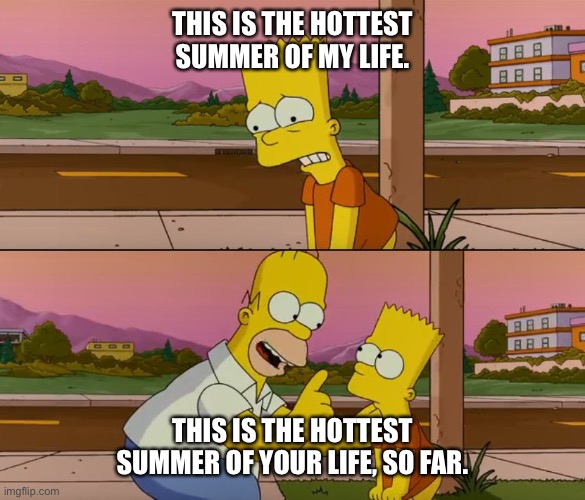Extreme heat kills and it will only get hotter: "We’re in serious trouble"
This summer, we’ve seen unprecedented global air temperatures and global ocean surface temperatures. And the heat only seems to get more and more intense – with deadly consequences.
In May 2023 we experienced sea surface temperatures globally that were higher than any previous May on record. And it continued with the hottest June on record globally, smashing the previous record of June 2019. And just a few days ago, it was confirmed that July 2023 was the hottest month ever recorded.
“These records have dire consequences for both people and the planet exposed to ever more frequent and intense extreme events,” said Samantha Burgess, Deputy Director of the Copernicus Climate Change Service (C3S).
“2023 is currently the third-warmest year to date at 0.43ºC above the recent average, with the average global temperature in July at 1.5°C above pre-industrial levels,” Burgess said. “Even if this is only temporary, it shows the urgency for ambitious efforts to reduce global greenhouse gas emissions, which are the main driver behind these records.”
2016 still holds the record for Earth’s hottest year. But according to forecasters, due to human-caused warming and a climate pattern known as El Niño, there is a 98 percent chance that at least one of the next five years will exceed that.
Global average temperatures have already increased with about 1.1°C since the 19th century. Steadily rising levels of greenhouse gases in the atmosphere, combined with natural El Niño conditions, will most likely cause temperatures to accelerate to new record highs. And scientists are warning that even small increases in warming can exacerbate the dangers from heat waves, wildfires, drought and other calamities.
According to the World Meteorological Organization (WMO), there is a two-thirds chance that the annual average surface global temperature between 2023 and 2027 will be more than 1.5°C above pre-industrial levels for at least one year.
“This will have far-reaching repercussions for health, food security, water management and the environment. We need to be prepared,” said WMO Secretary-General Prof. Petteri Taalas.
In other words: this summer's global heatwaves are just a foreshadowing of what's to come - and it's bad news for our health. We should be concerned not only about our own bodies' internal limitations in dealing with heat, but also about what heat can expose us to indirectly.
 Make no mistake. These heatwaves have deadly consequences. Last year’s heatwave in Europe killed more than 60 000 people. We still don’t have any numbers of this year’s heat-related deaths, but considering how bad it's been this summer - with extreme temperatures and wildfires - those numbers will surely be surpassed. “We’re in serious trouble,” said Dr Laurence Wainwright, a sustainability and psychiatry academic at Oxford University.
Make no mistake. These heatwaves have deadly consequences. Last year’s heatwave in Europe killed more than 60 000 people. We still don’t have any numbers of this year’s heat-related deaths, but considering how bad it's been this summer - with extreme temperatures and wildfires - those numbers will surely be surpassed. “We’re in serious trouble,” said Dr Laurence Wainwright, a sustainability and psychiatry academic at Oxford University.
And it is not just elderly people that are the most vulnerable to heatwaves.
“People with cardiovascular disease, chronic obstructive pulmonary disease and types of respiratory disease, diabetes, and pregnant women” are also at greater risk from heatwaves, according to Gregory Wellenius, professor of environmental health at the Boston University School of Public Health. In fact, “even the healthiest people can succumb to the impacts of heat.”
In Arizona this summer, many people have suffered third-degree burns just from walking barefoot outside, which have led people to call it a month in hell.
The heat is increasing the spread and potency of infectious diseases - such as dengue fever, malaria, Zika virus, and cholera. As the planet warms, these infectious diseases are spreading to new regions, such as Europe, that previously have been spared. The increased temperatures are also causing huge wildfires. Often with deadly outcomes, most recently seen in Hawaii. But wildfires also have more indirect consequences. In the United States alone, smoke from wildfires kills thousands of people prematurely every year.
Heatwaves could also alter human behaviour and pose a significant threat to our mental health. Studies have shown a surge in emergency department visits for mental health conditions during heatwaves, as well as an increased risk of suicide during hot days, and even a rise in gun violence in the US during unusual warm periods.
Already vulnerable groups are likely to suffer the most from increased temperatures and heatwaves. Unlike middle and upper-class people, who usually can work in air-conditioned offices, lower class people tend to work outside. And as it only gets hotter, these people will bear the brunt of the scorching heat. “Global warming, like other disasters, is just exacerbating inequality,” says Jason Kwai Lee, associate professor at the Yong Loo Lin school of medicine at the National University of Singapore.
“We complain, we suffer. And then this whole thing repeats again next summer.” We seem to forget about it, he says.
Let’s not forget about it this time. Let this summer be our wake-up call.

Recommended Comments
Join the conversation
You are posting as a guest. If you have an account, sign in now to post with your account.
Note: Your post will require moderator approval before it will be visible.